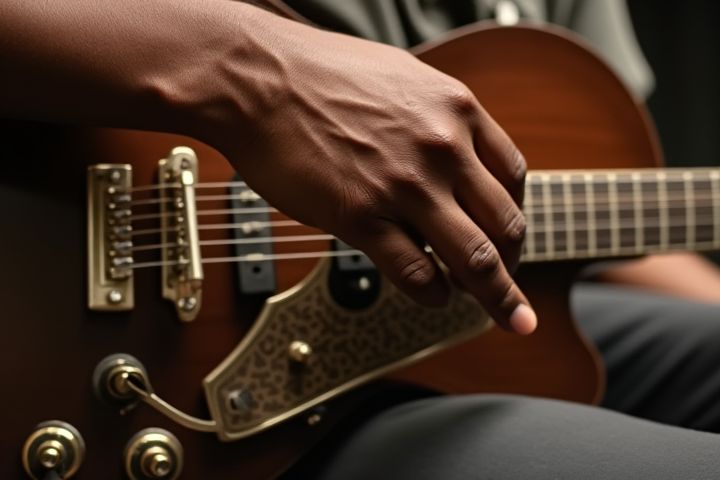
Nigerian music is a vibrant and diverse scene, showcasing genres such as Afrobeats, traditional folk, and hip hop. Artists like Burna Boy, Wizkid, and Tiwa Savage have gained international acclaim, blending contemporary sounds with rich cultural heritage. The fusion of traditional African rhythms and modern instrumentation creates a unique sound that resonates globally. Your exploration of Nigerian music will introduce you to captivating melodies and danceable beats that highlight the country's talent and creativity. Music festivals, such as the Lagos Fashion and Design Week, further celebrate this dynamic industry, fostering collaboration and cultural exchange.
Afrobeats dominance
Afrobeats has emerged as the dominant genre in Nigerian music, characterized by its infectious rhythms and vibrant melodies that blend traditional West African sounds with contemporary genres such as hip-hop and dancehall. Leading artists like Burna Boy, Wizkid, and Davido have significantly contributed to the global appeal of Afrobeats, with chart-topping hits that showcase rich cultural narratives and collaborative efforts that transcend borders. The genre's influence is evident in international music festivals and mainstream media, solidifying Nigeria's position as a powerhouse in the global music scene. As you explore this dynamic landscape, you'll discover how Afrobeats continues to shape the future of music, uniting diverse audiences through its celebratory essence and cultural depth.
Highlife and Juju roots
Nigerian music prominently features Highlife and Juju genres, both of which are deeply rooted in the country's cultural heritage. Highlife, characterized by its blend of traditional African rhythms and Western instruments, originated in the early 20th century and remains influential across West Africa. Juju music, primarily associated with the Yoruba people, integrates percussion and cultural storytelling with electric guitars and keyboards, creating a vibrant soundscape. This rich musical tapestry not only reflects Nigeria's diverse ethnic groups but also serves as a vehicle for social commentary and communal celebration.
Fela Kuti's Afrobeat legacy
Fela Kuti, the pioneer of Afrobeat, melded traditional African rhythms with jazz, funk, and highlife, creating a genre that transcended cultural boundaries. His politically charged lyrics often addressed issues such as corruption and social injustice, resonating deeply with Nigerian society and beyond. The ongoing influence of Kuti's music is evident in contemporary artists who draw inspiration from his innovative blending of sounds and potent messages. Exploring Afrobeat not only offers insight into Nigeria's rich musical heritage, but also highlights its role in global music evolution and social activism.
Wizkid's global impact
Wizkid, a Nigerian afrobeats artist, has significantly influenced the global music scene, bridging cultural gaps and fostering international collaboration. His hit singles, like "Essence," have topped charts worldwide, showcasing the rich diversity of African music to a broader audience. By partnering with global stars such as Drake and Beyonce, Wizkid has expanded his reach, solidifying afrobeats as a dominant genre. You can explore how his unique sound blends traditional African rhythms with contemporary styles, setting a precedent for future artists in the industry.
Burna Boy's international acclaim
Burna Boy, a Nigerian Afro-fusion artist, has garnered immense international acclaim for his unique sound that blends Afrobeat, reggae, dancehall, and pop. His Grammy Award-winning album "Twice as Tall" showcases his rich lyrical storytelling and cultural pride, resonating with audiences worldwide. Collaborations with global music icons like Beyonce and Coldplay have further elevated his status, introducing Afrobeat to diverse audiences. As a symbol of Nigeria's vibrant music scene, Burna Boy continues to inspire aspiring musicians and promote African culture on a global stage.
Nigerian music video creativity
Nigerian music videos showcase a vibrant blend of cultural aesthetics, storytelling, and artistic innovation. Directors often incorporate traditional dance forms, striking costumes, and dynamic cinematography, reflecting Nigeria's rich heritage while appealing to contemporary audiences. High production values and visually engaging narratives allow Nigerian artists to connect with viewers, pushing the boundaries of creativity in the global music scene. As platforms like YouTube and Instagram gain popularity, your access to these visually captivating representations of Nigerian music culture has never been easier.
Diverse regional styles
Nigerian music showcases a rich tapestry of diverse regional styles, each reflecting unique cultural influences and traditions. From the pulsating rhythms of Afrobeat pioneered by Fela Kuti to the melodic interplay in highlife music, the country's musical landscape is a vibrant mosaic. The Yoruba, Igbo, and Hausa ethnic groups contribute distinct sounds, integrating traditional instruments like the talking drum and shekere, enhancing the auditory experience. With the rise of artists like Burna Boy and Wizkid, Nigerian music continues to influence global genres while retaining its authentic roots.
Pidgin English in lyrics
Nigerian music prominently features Pidgin English in its lyrics, reflecting the country's rich cultural diversity and linguistic heritage. This creole language, often used for informal communication, allows artists to connect deeply with local audiences while also appealing to international listeners. Genres such as Afrobeats, hip-hop, and dancehall incorporate Pidgin English, creating vibrant soundscapes that convey relatable themes of love, social issues, and celebration. By embracing Pidgin, Nigerian musicians not only preserve their cultural identity but also enhance the global reach of their music.
Collaborations with international artists
Nigerian music has gained global prominence through strategic collaborations with international artists, resulting in a rich fusion of diverse genres. This cross-cultural exchange allows Nigerian musicians to blend traditional sounds with contemporary influences, appealing to wider audiences. Collaborations with artists like Drake, Beyonce, and Coldplay not only enhance visibility but also elevate local talents, showcasing Afrobeats on the world stage. Such partnerships contribute to the thriving Nigerian music industry, driving both commercial success and cultural appreciation.
Influence on fashion trends
Nigerian music significantly impacts global fashion trends, blending vibrant styles with cultural richness. Icons like Burna Boy and Wizkid showcase unique fashion choices that reflect their Nigerian heritage, inspiring fans worldwide to embrace bold prints and traditional attire. The Afrobeats genre has led to a resurgence in the popularity of Ankara fabrics, which are now incorporated into modern streetwear. As you explore this dynamic intersection of music and fashion, you'll discover how Nigerian artists are reshaping global aesthetics and empowering creativity.
